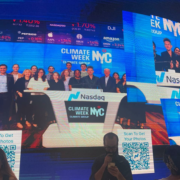Lendlease Calls on Industry to Tackle Built Environment’s Biggest Carbon Challenge

Global real estate company Lendlease has thrown down the gauntlet at Climate Week NYC – calling on industry peers to expand their decarbonisation efforts by addressing the largest source of the sector’s carbon emissions value chain or Scope 3 emissions. Scope 3 emissions are indirect emissions that occur in an organisation’s value chain and often make up the majority of an organisation’s carbon footprint. They are especially challenging to address in the real estate sector due to limited guidance on Scope 3 reporting boundaries. The built environment currently contributes approximately 40 per cent of global carbon emissions. In Southeast Asia, the sector accounted for almost a quarter (23%) of emissions, according to a report by PwC. Markets in Asia are also taking steps to create greater transparency and accountability for managing carbon emissions by the built environment sector.
In Singapore, listed and non-listed companies may soon be required to report climate-related disclosures based on International Sustainability Standards Board (ISSB) standards. In Japan, plans are being made to draft sustainability disclosure standards based on the ISSB framework. Lendlease is on track to achieve Net Zero Carbon (Scope 1 & 2) in Asia by 2025. With approximately 90% of total carbon emissions by Lendlease globally attributed to Scope 3 emissions – from upstream activities, such as the manufacturing of building materials and downstream activities, such as emissions from the use of electricity and natural gas by building tenants – Lendlease is turning to tackle scope 3 emissions in its journey to reach Absolute Zero by 2040.
To help accelerate the pace and scale of decarbonisation and contribute to the conversation on establishing consistent and comparable Scope 3 reporting boundaries across the real estate sector, Lendlease has launched its Scope 3 Protocol during discussions at Climate Week NYC. With the launch of the Protocol, Lendlease is calling for others in the industry – including developers, builders and construction material manufacturers – to turn their focus to addressing Scope 3 emissions, accelerating the shift to a low-emissions future. Lendlease is also calling for an industry-wide data-sharing platform to enable the secure exchange of digitised, verified Scope 3 emissions data across vast value chains.
“The Protocol is a seminal piece of work on our pathway towards Absolute Zero – with no offsets – by 2040. To know where to focus our decarbonisation, we need to first know how we are accounting for our Scope 3 emissions – what is material and therefore, what is in and out of scope. We want the Protocol to spark conversation and engagement across our sector, to help drive to a consensus on how to account for and report on Scope 3 emissions. If we can achieve this, then we can collaborate as an industry to solve the two big systemic challenges: the decarbonisation of harder-to-abate materials, and the digitisation and sharing of Scope 3 emissions data. The Protocol is intended as an important first step towards that outcome,” said Cate Harris, Group Head of Sustainability & Lendlease Foundation, Lendlease.
“Carbon is a new currency that the built environment sector is only beginning to grapple with. It is wonderful that Lendlease is taking the lead with active efforts to address and eliminate Scope 3 emissions without the use of offsets. This will send a strong message to the entire value chain and create the lead demand for low-carbon materials, as well as catalyse more industry collaborations to comprehensively and collectively address built environment carbon emissions. SGBC looks forward to supporting Lendlease’s efforts with our growing toolbox of carbon-centric initiatives, such as the newly launched Embodied Carbon in Buildings Calculation Guide,” said Yvonne Soh, Executive Director, Singapore Green Building Council.
Image Credit: Climate Week NYC via Facebook

